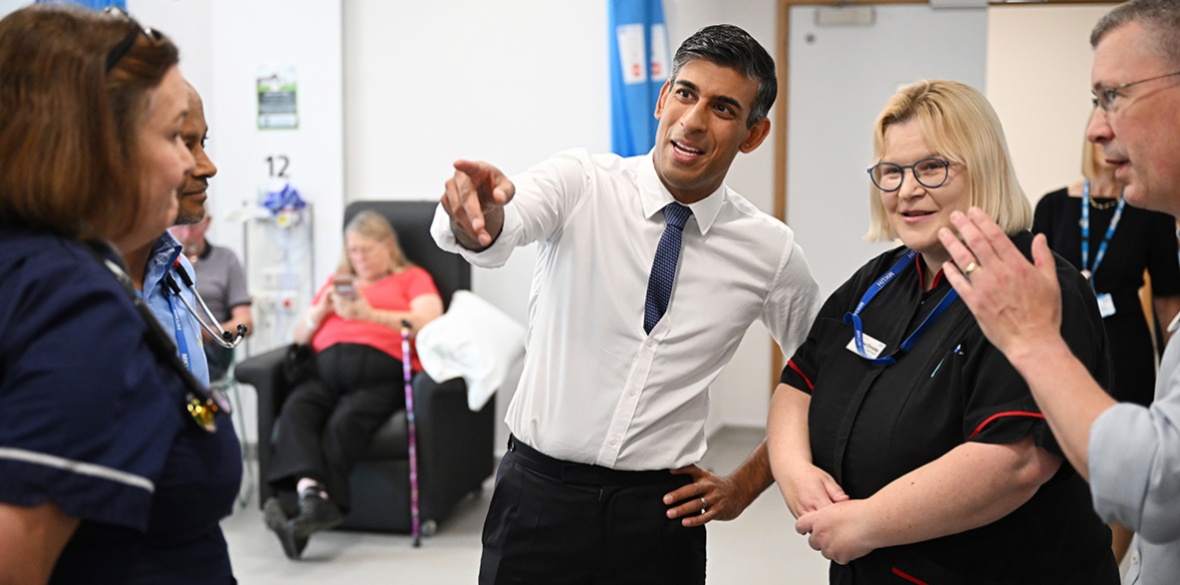This is the last article you can read this month
You can read 5 more article this month
You can read 5 more articles this month
Sorry your limit is up for this month
Please help support the Morning Star by subscribing here
CAMPAIGNERS hammered home the urgent need to pay healthcare staff fairly and end the “blatant failure” of relying on the private sector, after the government fell short of its key NHS targets — yet again.
Prime Minister Rishi Sunak made cutting NHS waiting lists a key pledge in January last year, but since then numbers have gone up by 330,000.
According to the latest figures, there are 7.54 million outstanding treatments.
Despite a promise to eradicate all waits exceeding 65 weeks by March, 75,000 patients are still waiting this long for treatment.
In A&E, just 74.2 per cent of patients were seen within four hours last month — missing the government’s target of 76 per cent.
Mr Sunak attempted to spin the statistics and blame the stunted progress on NHS strikes.
Figures showed that the waiting list shrank by 40,000 in February compared to the month before, which Mr Sunak said showed “headway.”
But the decrease is linked to a reporting change which now excludes patients waiting for treatment by community services.
Mr Sunak went on to claim that in the last five months, “had there been no strike action, an extra 430,000 patients could have been treated.”
The Royal College of Nursing, forced to strike for the first time in its history under Mr Sunak’s premiership, hit back.
RCN England’s executive director Patricia Marquis said: “Whichever way you count the numbers, the Prime Minister’s promise is colliding with the reality of an understaffed and under-resourced NHS.”
She added that the government must produce fair pay offers to “stabilise the workforce and bring down waiting lists.”
Dr Emma Runswick, deputy chair of BMA council, said that the Prime Minister “cannot continue to blame doctors for rising waiting lists, when in reality, they have been consistently increasing while successive Conservative governments have been in power.
“This all comes down to long-term underinvestment in the NHS, and an undervaluing of staff which has crippled our workforce.”
Unison head of health Helga Pile also called for a “prompt and decent pay rise” to recruit and retain staff and “proper long-term investment” in the service.
Wes Streeting said Mr Sunak had “failed on the NHS.”
The shadow health secretary said Labour’s proposals to increase reliance on the private sector would combat this and appealed to Sun readers for support this week, sparking a backlash from campaigners.
Mr Streeting has received at least £193,000 in donations from individuals with interests in private healthcare, including Peter Hearn, who has a reported $500 million (£395m) stake in US private health insurance company UnitedHealth.
The private sector has already been increasingly used to cut waiting lists.
On Monday, a BBC Panorama programme investigated Spire Healthcare, a chain that runs 39 private hospitals.
Hospitals were found to be performing surgeries despite lacking intensive care facilities, requiring patients to be transferred if their condition deteriorates.
Several preventable deaths were reported following delayed transfers.
According to anti-privatisation campaigners We Own It, private hospitals “cherry-pick” simpler operations as they are more profitable, siphoning money out of the NHS and leaving those with more complex conditions waiting even longer.
Johnbosco Nwogbo, lead campaigner at We Own It, also pointed out that private hospitals have no A&E facilities, so depending on them to cut wait times is a “blatant failure.”
“The NHS lags behind comparable European countries on almost all relevant metrics — such as beds, doctors and equipment per 1,000 people — because it has been drastically defunded for a decade.
“It’s time the government and other parties get serious and give the NHS the investment it needs to cut waiting lists and end their disastrous privatisation strategy.”
NHS England has ditched a target for 95 per cent of patients in A&E to be managed within four hours.
Dr Tony O’Sullivan, co-chair of Keep Our NHS Public, pointed out that this makes targets easier to hit, which is “dangerously callous.”
He said: “NHS England’s new instruction to A&Es, to focus on seeing less complex cases quickly, artificially disguises [the reality of] waiting lists and means longer waits for sicker and more complex patients, which puts them at risk.
“This is no way to overcome the 250-plus avoidable deaths every week caused by delayed admission and treatment.
“Ending targets for community waits amounts to an abject admission of failure by the government to support social care, GPs, nursing and mental health services in the community,” he said.











